FIRST FORM (YEAR 7) CURRICULUM
2025/26

FIRST FORM (YEAR 7) CURRICULUM
2025/26
Starting Senior School is an exciting step in your child’s educational journey. At King’s, our First Form pupils experience a rich and varied curriculum that builds on their primary education and prepares them for the years ahead.
Academically, this is a time of growth and discovery. Pupils are introduced to specialist teaching in every subject and begin moving between classrooms, which brings a new sense of independence and responsibility. The breadth of our curriculum is designed to challenge, inspire, and expand their learning horizons. For example, learning both French and Spanish in the First Form provides a strong foundation for future language choices at GCSE and beyond.
Our dedicated teachers aim to make every subject engaging and rewarding. We stretch able pupils and offer tailored support to those who may find certain areas more challenging, ensuring that every child has the opportunity to thrive.
Socially, First Form is a time for building new friendships and developing confidence. More than half of our pupils join us from a range of local primary schools, creating a vibrant and welcoming community. While they are beginning to grow up, our First Form pupils are still children who benefit enormously from the guidance and encouragement of their tutors and teachers. Our strong pastoral care is a cornerstone of the King’s ethos, and we take pride in helping each child settle in, feel valued, and enjoy life at Senior School.
This booklet outlines the broad and balanced curriculum we offer in the First Form, along with the key topics your child will study in their first year at King’s. You’ll also find information about our exceptional co-curricular programme, which plays a vital role in your child’s personal and social development.
We look forward to welcoming your child into our Senior School community, and to supporting them as they take these exciting first steps at King’s.
Leanne Bennett-Howells Head of First Form
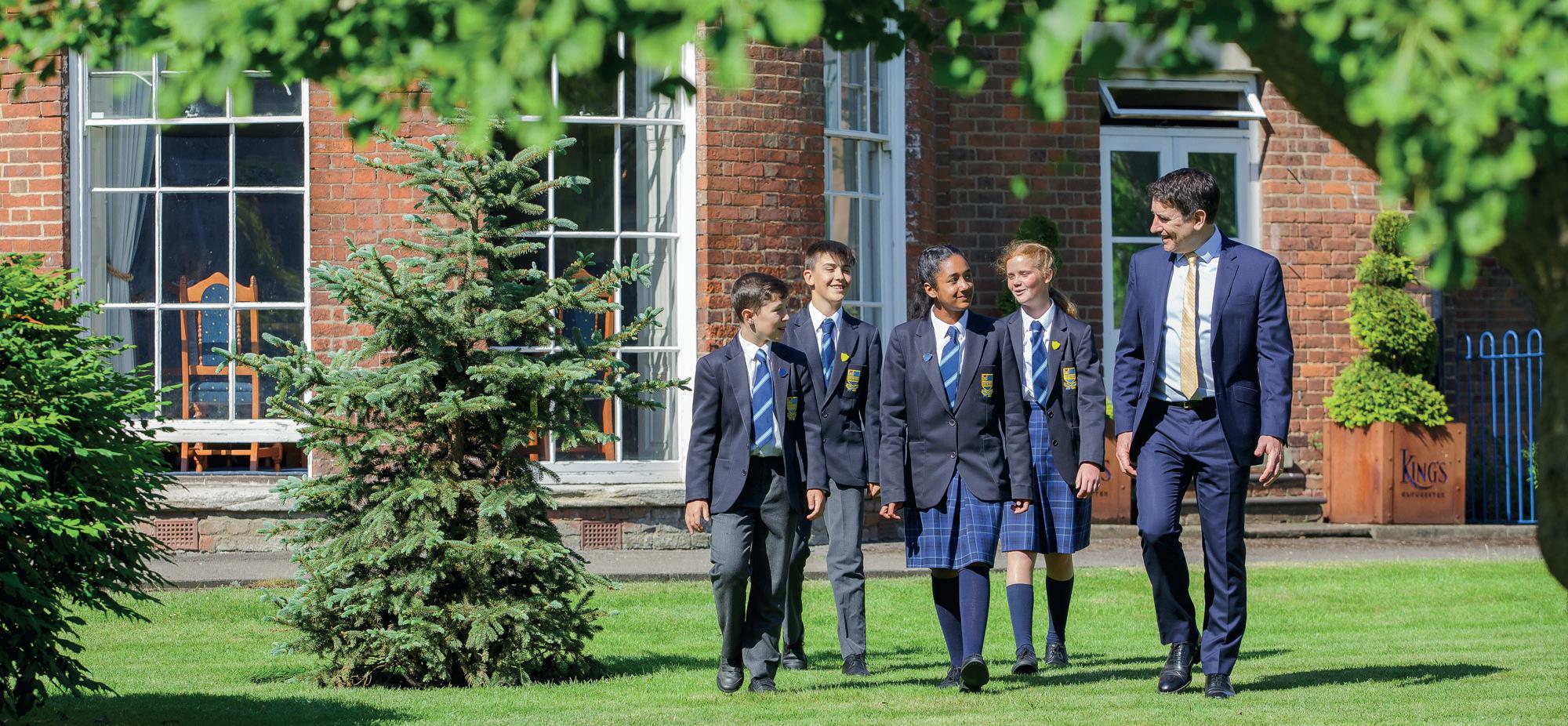
The English course in the First Form is designed to be inspiring, enjoyable and practical. Pupils enter this year with a variety of backgrounds and skillsets and we offer them all a methodical course that covers basic skills as well as providing stimulating new experiences. During their first year at King’s, pupils will revise and learn many key aspects of English study including reading critically, using a variety of writing styles and developing more complex sentence structures and vocabulary. We combine this with the opportunity to develop digital literacy, from researching the fascinating lives of some of the world’s best writers to using AI to generate mythological monsters for our creative writing. We embed spelling and grammar in context using set texts and varied writing tasks.
Much of the work we do is based on reading excellent books, and we want all of our pupils to come to love literature. Lessons also encourage discussion and debate to allow our students to flourish as critical readers. We begin the year reading a recently published novel set in Gloucester, which gives us the exciting opportunity to explore real-life settings and often allows students the chance to meet a local author. This has been a great way to see how exciting literature can be and to understand how it can relate to the world around our students. In addition, the study of Shakespeare is a particular strength at King’s; we introduce his world and theatre during the First Form to support understanding and engagement with his texts throughout the curriculum.
Creative writing is another important skill; we believe all pupils are writers and have voices that matter, and we care about supporting our students to develop how they express themselves. We aim to develop pupils’ writing for different audiences, and class work is supplemented by literary competitions, encompassing events such as National Poetry Day and World Book Day. Writing helps pupils to understand their own experiences and imagine others with empathy. It also promotes confidence, enjoyment and self-development.
Reading is crucial, of course, and all pupils have an allocated reading period in the library. What they read (within reason) is their choice – but they will experience a wide variety of texts, including at least one novel, plays, poetry and media. As they read, we hope they will begin to respond to texts with more sophistication, moving from plot and character to a deeper appreciation of a diverse range of writers and their craft.
All pupils receive lessons in mixed ability groups, where work is carefully differentiated both to stretch and challenge the most able and support those who find it harder. Liaison with Learning Support is strong and extra lessons and help are always there for those who find the work challenging.
Homework, which the school calls prep, is set regularly and can comprise reading, research or planning for a piece of written work. This is to encourage our pupils to find their feet and grow in confidence.
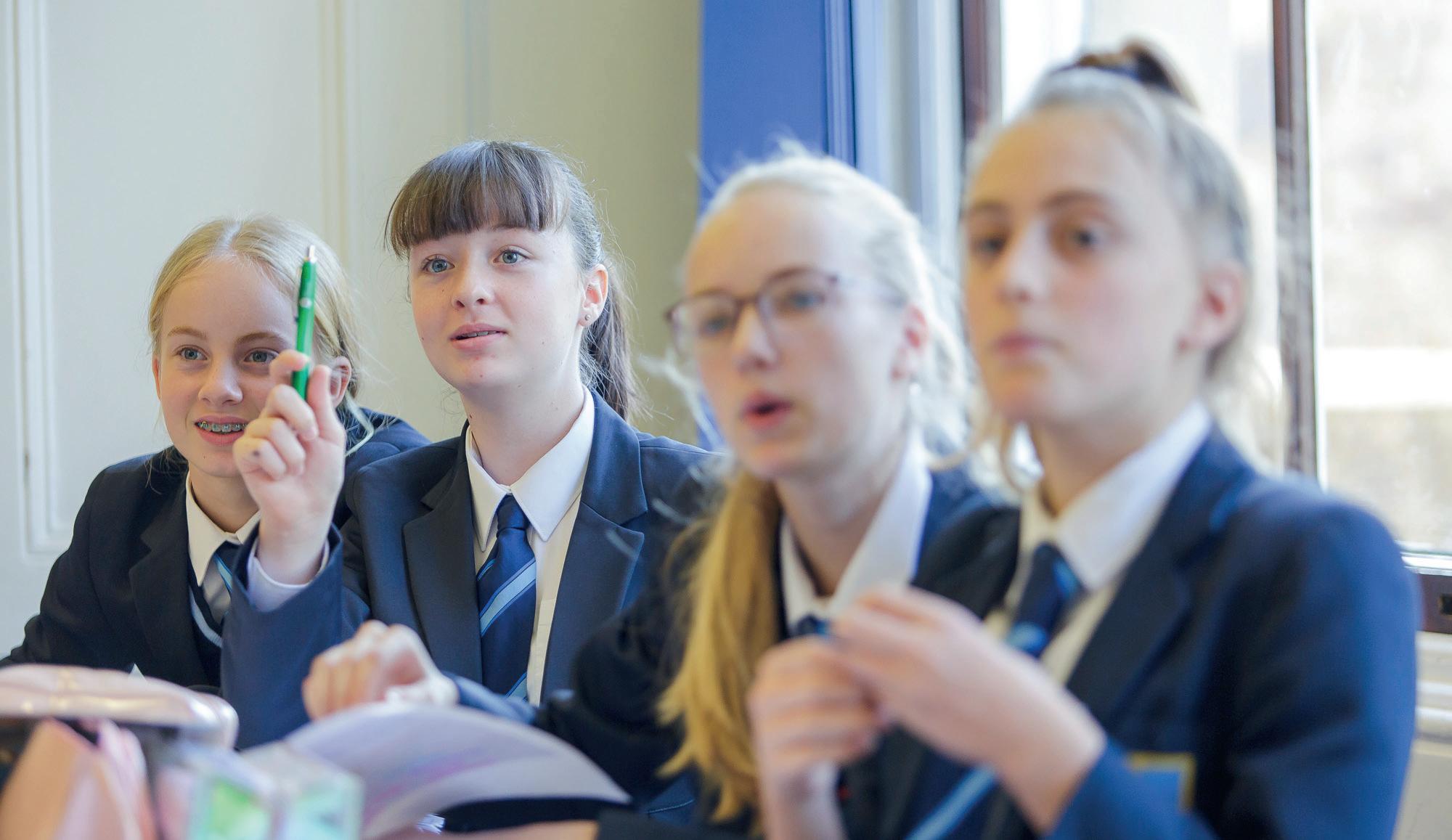
The First Form Mathematics course at King’s introduces pupils to secondary level Mathematics in a manner that is engaging and enjoyable, yet suitably challenging for all pupils. We follow the Sparx Scheme of Work, which is also easily accessible to parents and carers. The teaching is highly interactive with the aim of developing understanding and confidence, as well as an appreciation of the power and beauty of Mathematics, and the importance of clarity, accuracy and rigour. A variety of activities and resources are used, including group work, pupil led board demonstrations, problemsolving and investigations. Topics are explored through website and software packages such as Dr Frost and Desmos.
Pupils are encouraged to take part in competitions and events such as the AMSP Maths Spread and the National Cipher Challenge. Pupils are also entered for the UKMT Maths Challenges each year. Our curriculum is designed to ensure pupils develop mastery and a deep understanding of every topic, so that we can engage their interest and develop their skills and understanding to the full.
We aim to make the most of our pupils’ tremendous desire at this age to learn and to be successful, introducing them to topics such as linear and quadratic algebra, expanding their geometry and statistical analysis skills, as well as developing their understanding of number, ratio and proportion, their ability to reason mathematically and their confidence to conquer the challenges of problems set in context. This approach means that, as the pupils progress through the school, they will feel more comfortable with the demands of all aspects of Mathematics IGCSE and they will enjoy their first experience of Senior School Mathematics.
First Form pupils have six lessons of Mathematics and two preps per fortnight. In order to ensure that all are provided with a curriculum closely tailored to their needs, they are set into ability groups early in the Michaelmas Term. These sets are reviewed regularly to ensure each pupil is in the appropriate group to make the best possible progress.

First Year Science classes are taught in their tutor groups. Pupils follow a stimulating course, designed to make the subject interesting and relevant. The philosophy of Science teaching at Key Stage 3 is to reach out to students and engender a sense of wonder about the world that they live in.
Each Science class is taught by one science teacher for the whole year. The topics studied are identifiable as either “How Science Works,” (Inquiry skills and laboratory safety), “Biology “(Cells and Movement), “Chemistry” (Particles, Acids and Alkalis) or “Physics”, (Forces and Space, Light and sound). Each topic is assessed by either a short test or an assessed task,
and teachers use a variety of methods to assess pupils’ progress. Lessons are hands-on, interactive, and include a large element of practical work. These experiments can be shorter to illustrate some theoretical points, or more extended to introduce the skills of scientific investigation. Pupils are encouraged to develop a sense of enquiry and curiosity, building on their understanding of how the world works.
There are also educational visits, such as to the Cheltenham Science Festival, project work and competitions organised to enhance the whole learning experience.

All pupils in the First Form study French and Spanish. Four periods per fortnight are allocated to each language. The skills of speaking, listening, reading and writing are taught, alongside the acquisition of vocabulary and grammar. The emphasis of our teaching encourages communication and good pronunciation seeking to develop confidence.
The First Form is an important time for establishing the standards and the enthusiasm that are necessary in order to lay a firm foundation for GCSE work later on. All pupils are encouraged to perform at an appropriate academic level, and lessons demand a high level of pupil attention and participation. Classes are taught in mixed ability tutor groups in the first instance. At the end of the year there is a formal examination in both languages including an oral test. New pupils, who have not previously studied French or Spanish, need not be
worried since the courses start at beginner’s level. This gives new pupils the opportunity to integrate very quickly, whilst those who have some prior knowledge will have the chance to consolidate what they have done during the first few weeks. We differentiate different abilities effectively and can provide additional extension for those further advanced in their language study.
The content of the course is as set out in Dynamo and Viva. The course covers such topics as self and family, pets, school, likes and dislikes, free time, the weather, numbers, colours, food etc. ActiveLearn is an interactive resource which enables pupils to consolidate skills at home.
There is a trip to Paris and Spain in the Third or Fourth Year.
Philosophy and Religion and Ethics are at the centre of the First Form PRE course.
The first term is a study of what philosophy is and how we establish evidence for our knowledge. We also study arguments for and against the existence of God, e.g. The Cosmological Argument, The Design Argument and the Problem of Evil. Students really enjoy this challenging content as they question what they already think they know in a quest for true knowledge and justified arguments.
In the second term, students embark on a study of one of the Abrahamic religions: Christianity. We aim for students to finish the First Form being able to explain how this religion originated, developed, and changed over time, as well as the similarities and differences of beliefs and practices within it as a faith, and the impact it has on people’s lives and society at large.
In our final term of the year, we explore the idea of ethics. What is right and wrong and how do we come to make these decisions? On what are we basing such important decisions? We then apply these ideas
to discussing and debating the issues surrounding animal rights.
The key skills we develop are using evidence, scriptural analysis, explanation and evaluation. We focus on developing students’ essay planning and writing skills so that they think for themselves about what a particular question is demanding from them, whilst also studying knowledge that really matters in their future lives by thinking about how we decide whether to believe something or dismiss it, always using evidence.
Discussion and debate are at the centre of our lessons, and usually form the basis for key learning points such as justifying arguments with evidence, as well as evaluating why some views are stronger or weaker than others and why. Role play and learning games are also used to develop students’ metacognition and really think about their thinking.
The First Form PRE course is a voyage of discovery and sets a firm foundation for the Second Form study of PRE.
The History curriculum in the First Form takes pupils on a journey through the Medieval World. We begin our course in Anglo-Saxon England and examine the fight for the throne in 1066. On our historical journey, we uncover how the Normans changed England and left their mark on the country we live in today; we consider the importance of the Medieval Church and the changing relationship between religion and the Crown; we study key turning points such as the Black Death and the Peasants’ Revolt allowing pupils to establish parallels between the challenges faced in the past and the present; we enjoy getting to know about life in Medieval England and realise that food and community activities have drawn people together for generations. In addition to the British Isles, we place great importance on understanding the wider world through our discovery of Islamic Civilisations and the Crusades, where we consider their impact on the advancement of knowledge and the importance of diplomatic relations.
In addition to developing strong historical knowledge and a sense of place, we also seek to nurture an understanding of continuity and change. We strive for pupils to be able to identify important turning points and see in events in their historical context. Pupils will also develop an awareness of differing interpretations and be able to assess the significance of events and individuals with confidence. Pupils will gain an insight into source analysis and evaluation and be able to communicate their ideas about history effectively through written work, discussion, role-play and drama, using a range of primary and secondary sources.
We make excellent use of our wonderful school site and frequently visit Gloucester Cathedral to enhance our understanding of religion in the Middle Ages. In addition to this, we also take an annual trip to a site of local interest that complements our study, such as Chepstow Castle, Tintern Abbey or Warwick Castle.

In First Form Geography we seek to encourage the development of inquisitive, caring young people through increasing pupils’ awareness of current global issues and as well as those in our local area. The programme of study includes topics such as: The World Around Us, Oceans and Plastic Pollution, Settlement, Exploring the UK and Map Skills. The work covered gives each student the opportunity to strengthen their literacy, numeracy and ICT skills, as well as learning how to analyse different types of resources such as photographs, video footage and maps. In the Trinity Term, First Form pupils go into the city and, working together, establish whether Gloucester is a “Home Town” or a “Clone Town”. This local piece of fieldwork is an ideal way to introduce young pupils to the enquiry process.

In the First Form we teach recording skills using a vast array of materials and techniques, drawing using all manner of styles and processes, colour theory through the application of mixed media and an introduction to Art Movements. Each term is dedicated to one of these specific disciplines that come under the title of Fine Art that is built upon as pupils progress through the year groups.
These areas are approached using a combination of traditional and contemporary techniques and processes which enable the pupils to build visual language skills, problem solving and communication in a highly creative and dynamic atmosphere.
Pupils are encouraged to discuss, explore and engage with the work of other artists and other cultures so that they understand the importance of art in the 21st century. All work is recorded in the form of sketchbooks with ‘outcomes’ generated and taught in three fortnightly lessons.
Individual creativity is strongly promoted and we believe firmly in working towards exploration and excellence at this formative time. For those who wish to develop their creative skills further a wide range of extracurricular and enrichment activities are held throughout the year where specialist techniques in a range of areas are studied in small group sizes at times with professional artists.
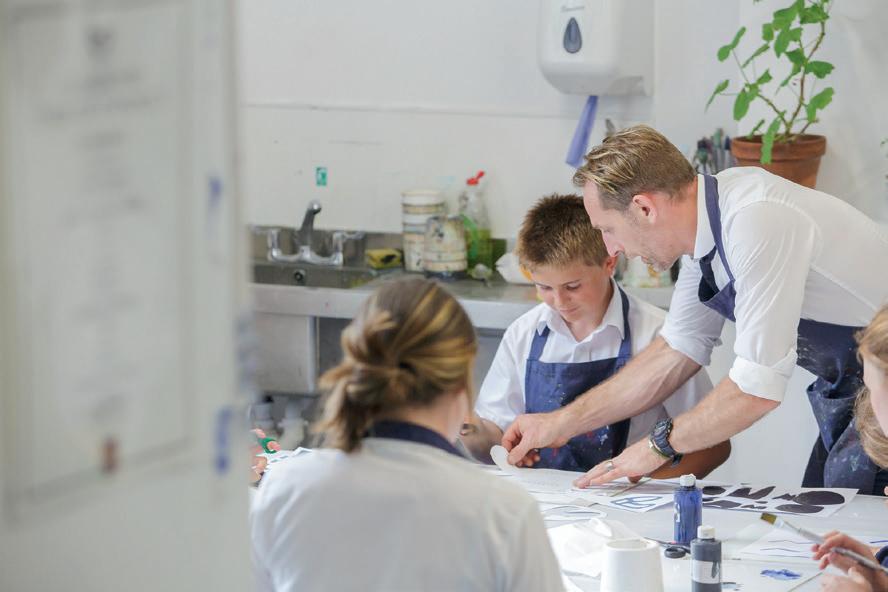
The Design Technology Department, with its two well equipped workshops and specialist staff, provides a safe, happy, and inspiring learning environment for First Form pupils to start their journey through this creative subject.
Our curriculum is targeted at building pupil’s confidence with the fundamental principles of designing and making and problem solving. We aim to provide a firm foundation for more independent work in future years.
An introductory module welcomes pupils to the department, and all pupils in the First Form, regardless of experience or skill level, are taught correct workshop procedures, along with extensively focussed health and safety training in the Design and Technology workshops.
First Form pupils then confidently move on to complete a range of challenging projects, utilising different materials, tools and processes. They will develop a
range of designing and graphical communication skills as they create ideas and develop their making skills when realising products with specific clients and design influences identified. Pupils are encouraged to create dynamic, innovative, and challenging designs and to produce accurately constructed and well finished artefacts under controlled supervision. In addition to more traditional practical skills, pupils are introduced to the inclusion of ICT and CAD/CAM in Design Technology as well as modern design related issues, namely the environment and sustainability.
Each project is supported with a workbook that sets out the key learning points and these are an excellent resource for revision and homework with extension activities provided to stretch and challenge all learners.
The Design and Technology Department also runs a dedicated First Form lunchtime activity during which interested pupils can design and make set products as gifts or simply for the enjoyment of making.
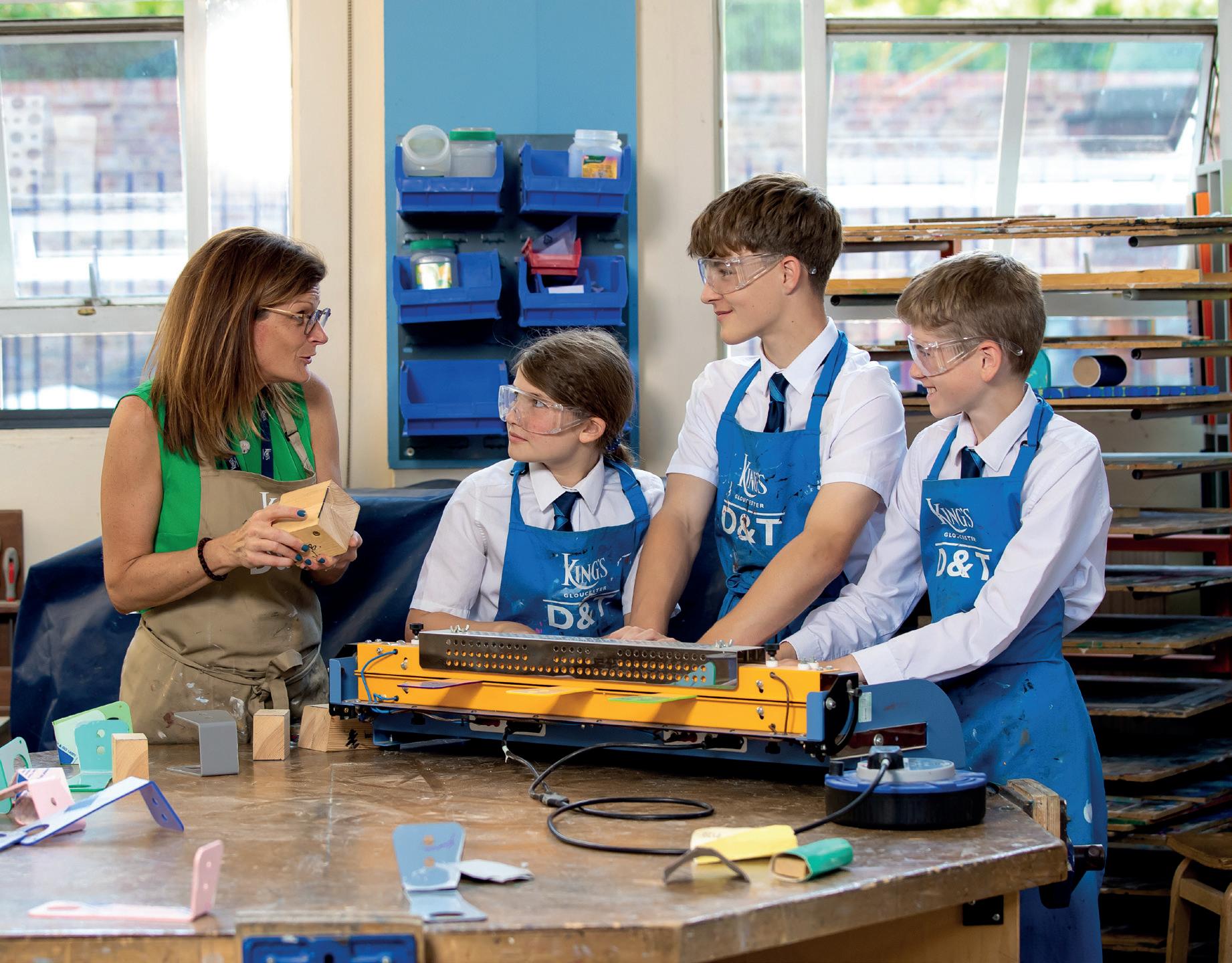
All pupils in the First Form have three lessons per fortnight, backed up by a series of extra-curricular musical activities for all who sing and play a musical instrument.
The course has a strong emphasis on the fun and enjoyment of music, and practical music making is a key part of the music curriculum. There are a number of opportunities during the year for everyone to be involved in performance.
Individuals who sing or play instruments are always encouraged to bring along their music and instruments and perform either alone or with the group. All pupils have the opportunity to create music using keyboards, ukuleles and percussion. Sibelius notational software is used during some of the composition lessons.
We listen to and study a wide range of music including more popular genres such as Reggae, Rock ‘n’ Roll,
Musicals and Film Music. All pupils are taught the basics of music theory with opportunities for the more able to work at their own level. We also provide extra tuition for Grade 5 theory.
For those who meet the required standard there are a number of extra-curricular groups. These include the Orchestra, Swing Band, Brass Group, Flute Ensemble, String Ensemble and Pop Groups. Singing is a strong part of the curriculum and pupils may join the Key Stage Three Choir. We also arrange smaller ensembles where possible. There are termly concerts (both formal and informal), concerts out of School, the biennial House Music Competition and our traditional Service of Lessons and Carols and a Key Stage Three specific concert. We have a team of visiting music teachers should your son/daughter wish to have individual tuition on an instrument/voice (extra charges apply).
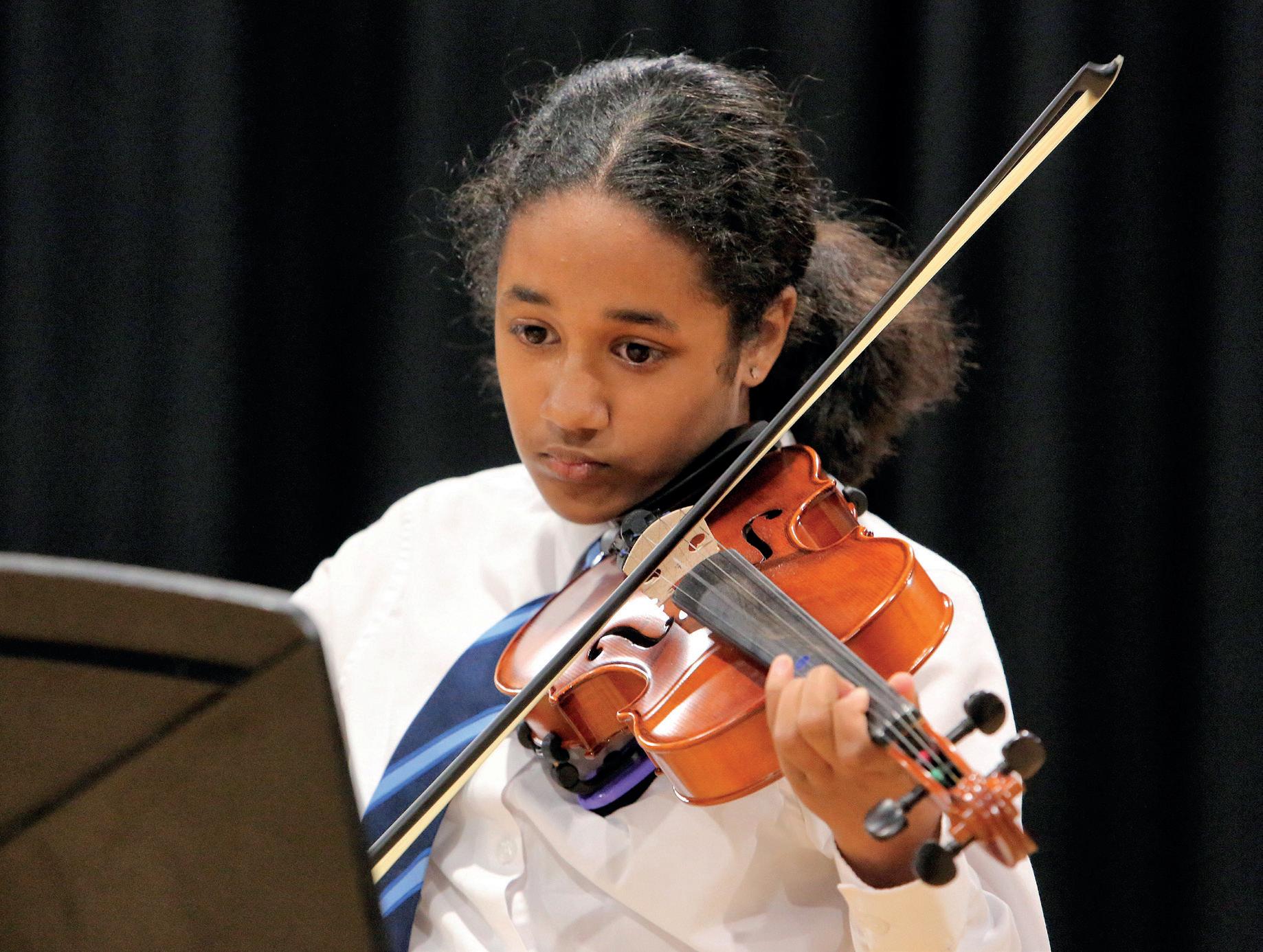
Computer Science has the potential to influence many careers in the future, and, here at King’s, we recognise the importance of this. Pupils have three Computer Science lessons every fortnight in the First Form. An innovative and dynamic approach to these lessons will enable pupils to develop their understanding of the subject whilst experiencing some of the most exciting advancements in technology, such as robotics and artificial intelligence, augmented reality, and virtual reality.
Lessons will build pupil knowledge of computational thinking through exploring the programming language Small Basic, as well as exploring problem solving in Python. The curriculum structure will allow pupils to further develop their understanding around computer
hardware and software alongside being introduced to the concepts related to image enhancement and image manipulation to further develop their technical skills and awareness of the powerful influence of computer programmes. They will work with Microbits, where a practical application of coding can be seen on the display.
Pupils will be encouraged to use computers and software within the wider curriculum, with the expectation that all will gain a proficiency in using basic software. This will be achieved through completing a project to make pupils more familiar with the software in the Microsoft Office package.

Drama gives people the opportunity to create, perform and explore our own journeys as well as the experiences of others. It embraces the world around us, exploring through practical means the way the world works and how we exist within it. It is exciting and creative, rewarding and engaging. The subject allows for endless amounts of creativity and imagination, developing empathy and understanding as well as practical and technical skills.
At King’s, Drama is about discovery: finding out about the ways in which theatre can be made, issues and themes explored and characters portrayed. Students have one formal lesson of Drama a week and learn practically, developing skills in teamwork, time management and organisation as well as developing confidence and the ability to problem solve. In the First Form we explore vibrant scripts and diverse topics, whilst also exploring different genres and styles. We aim to foster a love of communicating through creating, performing and responding to theatre.
King’s Drama Department encourages theatre inside and outside the classroom, offering many opportunities for both academic learning and extra-curricular development. We provide Drama Clubs for KS3 pupils and do two productions a year: one whole school and
one just for KS3. The most recent productions have included Jesus Christ Superstar, Wendy and Peter Pan, Matilda, Brothers Grimm Spectaculathon and The Lion, The Witch and The Wardrobe – something to interest every pupil. We also do House Drama bi-annually. Alongside performing we focus on training students in technical theatre so that they can take on the vital roles of the production team including student director, stage manager, lighting, sound and costume design. The department also offers LAMDA lessons alongside many other rewarding extra-curricular opportunities.


Pupils are taught seven areas of activity, which fulfil the requirements of the National Curriculum at Key Stage Three: Games, Athletics, Basketball, Dance, Gymnastics, Swimming and Outdoor and Adventurous Activities.
Games are a very important part of our curriculum, including sports such as Rugby, Hockey, Netball and Cricket. Basic skills are taught through to game playing. It is hoped that pupils will not only enjoy these Games lessons but will strive to represent school teams in one or more of the major Games.
Gymnastics follows the theme of advanced movements and techniques of balance. Emphasis is on developing body strength, quality in extension, clarity of body shape and methods of weight bearing.
In Swimming the pupils will be taught the correct technique for the three major strokes. Emphasis will be placed on improving and developing the overall efficiency of these strokes through a variety of drills. The pupils will also participate in the ASA ‘Speed Award Scheme’.
Basketball has been introduced into the curriculum to develop confidence and ability in catching, passing, dribbling and shooting skills. These skills are then incorporated into small-sided games and competitive matches.
Dance develops the idea of body action to be used in as many different ways as possible. These include the main actions of gesture, turn, travel, growing, leaping, stretching and balance. Pupils will have the opportunity to perform in the school ‘Dance Show’.

Athletics continues to develop running, throwing and jumping techniques as already introduced in earlier years. More emphasis is on style and technique and involvement with safety in competition. The pupils will participate in the England Schools Key Stage 3 Athletics Award Scheme throughout the summer term.
Outdoor and Adventure Activities are combined in an activity weekend at the end of the First Form. Activities include kayaking, caving, climbing and ropes under qualified supervision.
The aim of Physical Education is to promote physical activity at all times in order to encourage a healthy lifestyle. As individuals, in pairs or as a team, pupils are guided in safe practice, finding solutions, responding to various challenges and tasks and refining movement with practice. Control of performance and accuracy are developed and the ability to judge simply or analyse one’s own and others’ performances. Pupils are also instructed on the importance of warming up, sustaining an energetic activity for an appropriate period of time and cooling down afterwards. They should understand at this stage the short-term effects of exercise on the body.
A variety of methods are used to introduce and develop skills in these areas of activity. Experimentation, problem solving, basic skill learning and repetition, through to the introduction of rules and full game situations are used. Much of the learning process is still guided by the teacher at this stage.

The King’s School Gloucester GL1 2BG
Tel: 01452 337337
Email: office@thekingsschool.co.uk
Web: www.thekingsschool.co.uk